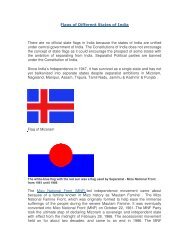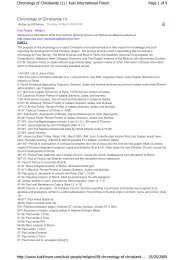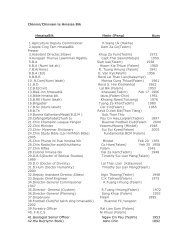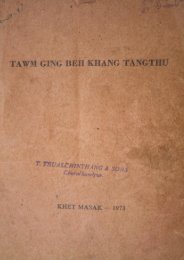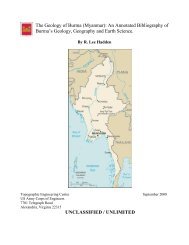abstract - Zomi Online Library
abstract - Zomi Online Library
abstract - Zomi Online Library
Create successful ePaper yourself
Turn your PDF publications into a flip-book with our unique Google optimized e-Paper software.
21<br />
(2) Raids committed by the Siyin tribe in Kale territory.<br />
(3) The encouragement of trade between Chins and Shans on the east and between Chins an Chittagong on the<br />
west of the Tashon tract.<br />
(4) The advance of an exploring party through the Tashon tract to examine and report on trade routes through<br />
the Tashon tract to Chittagong.<br />
With regard to the recognition of the Sawbwa Maung Pa Gyi, Sonpek remarked that the whole of Burma belonged to<br />
the British Government, and that the British Government could of course nominate whomever they pleased as Sawbwa.<br />
He and his people were quite willing to recognize the Sawbwa in possession as ruler of the Kale country. No raids had<br />
been committed by the Siyin tribe since some members of his tribe had been interviewed at Indin in March 1887. This<br />
cessation of raids was attributed, to a great extent, to the influence excercised by Sonpek over Chins of the Siyin<br />
tribes, and Sonpek was congratulated on the success which had so far attended his intervention between the Siyin<br />
Chins and the people of Kale. Hope was expressed that he would succeeded in preventing all raids in future and that in<br />
case the Siyin tribe should recommence raiding he would do his utmost to help the Sawbwa to resist. Sonpek replied<br />
that he had not sufficient authority over the Siyins and the Sagyilains to stop raids and that he could not undertake to<br />
restrain them, but that in case raids should recommence he would willingly give all assistance in his power to the<br />
Sawbwa.<br />
Captain Raikes explained to Sonpek that we were anxious to encourage trade not only in Burma, but also in<br />
Chittagong and now that the British owned all the country on the east and west of his tract, it would undoubtedly be a<br />
good thing, and advantageous for all parties concerned, that trade should be equally maintained with Chittagong on one<br />
side, and with Kale and the Chindwin on the other. With a view to ascertaining how this trade could best be developed,<br />
Captain Raikes was anxious to learn all particulars about the existing trade route and to visit it himself. Sonpek<br />
remarked that the question of a trade route between Kale and Chittagong through his country had never been raised by<br />
Burmese officials sent by the King of Burma or by the Kale Sawbwa. Captain Raikes replied that he knew that to be the<br />
case, and that the reason why no such proposal had previously been made was easily explained. When the last<br />
interview was held several years before, the Kale and Chindwin country belonged to the Burmese, while Chittagong<br />
belonged to the British; now, however, the whole country on both sides belonged to us and it was only natural that we<br />
should wish to open our trade.<br />
Sonpek said that he was not prepared to answer any questions about the route; that such a route existed he had no<br />
doubt, but he knew nothing personally about it, and he considered it unadvisable that any advance should be made<br />
through the Tashon hills at present. He wished for time to consider the matter and he wished to consult the other<br />
Tashon Chiefs who were not at the durbar. He did not intend actually to object to the British Government sending a<br />
party through his country, but it was impossible for him to guarantee the safety of that party; his territory was<br />
extensive, the people wild, and he had no means of ensuring safety to life and property. If he gave any promise to the<br />
effect that a party sent by the British Government through his country would not be molested, he would be accused of<br />
treachery if afterwards the party met with any opposition. He therefore declined to say anything except that, so far as<br />
he was personally concerned, he had no objection to a party passing through his country, provided that he were relieved<br />
from responsibility in case the party met with opposition. He protested, however, against any advance being made<br />
immediately, or until he had had time to consult with the other Chiefs and to thoroughly prepare his people for our visit.<br />
Sonpek also said that he was not in a position to give any particulars as to the country to the west of the Tashon<br />
tract. He did not know whether the Tashon tract adjoined Chittagong, or whether there were other tracts and tribes<br />
between Tashon and Chittagong, and he begged that no more questions might be asked as he was not accusstommed<br />
to long interviews. The proceedings then terminated with a large distribution of presents, which Sonpek at first refused<br />
to accept, saying that he did not wish for presents, that he had brought none himself(he brought two baskets full of<br />
rotten eggs), and that all he wanted was to make the acquaintance of Captain Raikes. After a good deal of talking he<br />
accepted the presents for himself and the other Chiefs. Major Macgregor, who was present throughout the interview,<br />
allowed the Gurkhas who accompanied the party to fire two volleys and five rounds of independent firing. The Chins<br />
were astounded at the effect of the two volleys on a target at 500 yards.



